Domestic Violence Act - 2005
Domestic Violence Act - 2005
- Domestic violence means
- Who is covered under the Act?
- Who can file a complaint?
- Against whom can a complaint be filed?
- To whom can information be given or complaint be made?
- What is a domestic relationship?
- Provision for shelter home and Medical Aid
- Domestic Incident Report (DIR)
- Important Judicial Pronouncements
Domestic violence means
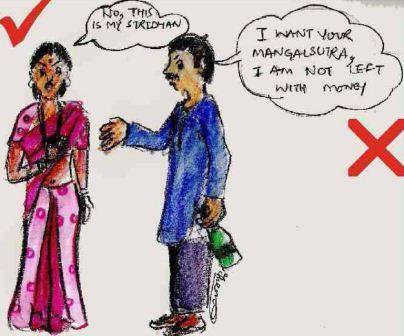 Causing hurt, injury or danger to life, limb, health, safety or well-being, whether mental or physical.
Causing hurt, injury or danger to life, limb, health, safety or well-being, whether mental or physical.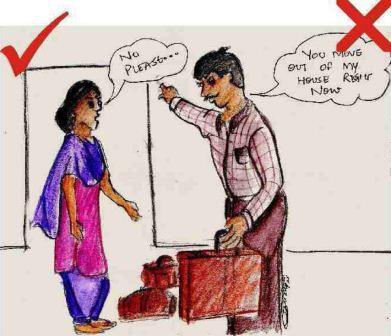 Causing harm, injury, or danger to the woman with an intention to coerce her or any other person related to her to meet any demand for dowry.
Causing harm, injury, or danger to the woman with an intention to coerce her or any other person related to her to meet any demand for dowry.- “Physical abuse" includes hurt of any kind. Assault, criminal intimidation and criminal force.
- “Sexual abuse" such as conduct of a sexual nature such as forced sexual intercourse, forcing the aggrieved person to watch pornography or other obscene material. Forcibly using woman to entertain others, any other act of sexual nature, abusing, humiliating, degrading or otherwise violative of one’s dignity.
- “Verbal and emotional abuse" such as Accusation/aspersion on character or conduct. Insult for not brining dowry, Insult for not having a male child. etc. Forcing to not attend school, college or any other educational institution preventing one from taking up a job repeated threats to cause pain to any person in whom the woman is interested. Preventing from marrying a person of your choice.
- "Economic abuse" such as not providing money for maintaining woman or her children Not providing food, clothes, medicine. etc, Forcing woman out of the house. Preventing from accessing or using any part of the house, preventing or obstructing one from carrying on employment Non-payment of rent in case of a rented accommodation, selling or pawing stridhan or any other valuables without informing and without consent. Forcibly taking away salary, income or wages etc. Non-payment of other bills such as electricity, etc.
Who is covered under the Act?
- The Act covers all women who may be mother, sister, wife, widow or partners living in a shared household. The relationship may be in nature of marriage or adoption. In addition relationships with family members living together as a joint family are also included. However, no female relative of the husband or the male partner can file a complaint against the wife or the female partner, for e.g. the mother-in-law cannot file an application against a daughter-in-law, but she can file an application against her daughter-in-law for abetting her son to commit violence against her.
Who can file a complaint?
- Any woman who alleges to have been subjected to any act of domestic violence by the offender or any person may file a complaint on her behalf
- A child is also entitled to relief under the Domestic Violence Act. The mother of such a child can make an application on behalf of her minor child (whether male or female). In cases where the mother makes an application to the court for herself, the children can also be added as co-applicants.
Against whom can a complaint be filed?
- Any adult male member who has been in a domestic relationship with the woman
- Relatives of the husband or the male partner
- Includes both male and female relatives of the male partner
To whom can information be given or complaint be made?
- Information may be given arid complaint can be made to a police officer/Protection Officer/Service provider (an NGO) or Magistrate.
What is a domestic relationship?

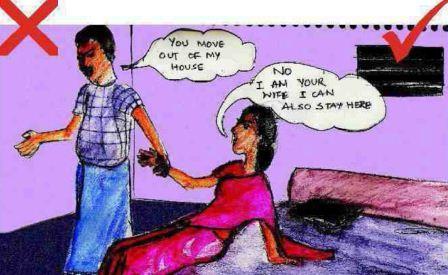
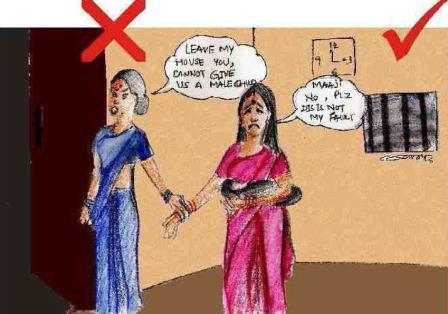
- Relationship between two persons who live or have at any point of time lived together in a shared household
- Includes relationship of consanguinity, marriage, relationship in the nature of marriage.
- Shared household is a household where the woman lives or has lived with the man in a domestic relationship. She may not be living in the shared household at the time of the application for relief but such women are entitled to relief under the Domestic Violence Act as long as the domestic relationship subsists.
- Every woman in a domestic relationship has the right to reside in the shared household, even if she does not have any right, title or interest in it.
Provision for shelter home and Medical Aid
An aggrieved person or on her behalf a Protection Officer or service provider can request to a person in charge of a shelter home or a medical facility to provide shelter or medical aid to her.
Who may file an application to the magistrate?
- An aggrieved person or
- A Protection Officer or
- Any other person on behalf of the aggrieved person may present an application to the magistrate
- It is the duty of the protection officer and the service provider to provide all assistance to the woman who is a victim of domestic violence.
Orders which a Magistrate may pass under the Act
The Magistrate may –
- Direct the respondent or the aggrieved person, either singly or jointly, to undergo counseling.
- Direct that the woman shall not be evicted or excluded from the household or any part of it.
- If considered necessary, the proceedings may be directed to be conducted in camera.
- Issue Protection order, providing protection to the woman.
- Grant monetary relief to meet the expenses incurred and losses suffered by the aggrieved person and any child of the aggrieved person as a result of the domestic violence.
- Grant custody orders, i.e., temporary custody of any child or children to the aggrieved person.
- Grant compensation/damages for the injuries. Including mental torture and emotional distress caused by the acts of domestic violence committed by that respondent.
- Breach of any order of the Magistrate is an offence which is punishable under the taw.
- The Act is in addition to existing laws
- Aggrieved person has the right to file a complaint simultaneously under Section 498A JPC
- Reliefs under the Domestic Violence Act can also be asked for in other legal proceedings e.g. petition for divorce, maintenance, Section 498A IPC, etc
Domestic Incident Report (DIR)
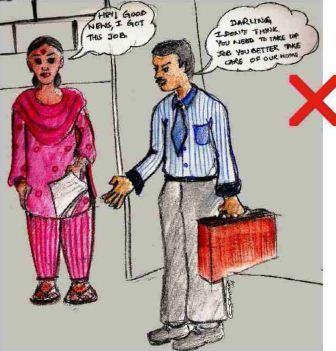 Upon receipt of a complaint of domestic violence, the Protection Officer or the Service Provider has to prepare a DIR in Form 1 (as provided in the Domestic Violence Act) and submit the same to the Magistrate and copies of the same to the police officer in charge of the concerned police station.
Upon receipt of a complaint of domestic violence, the Protection Officer or the Service Provider has to prepare a DIR in Form 1 (as provided in the Domestic Violence Act) and submit the same to the Magistrate and copies of the same to the police officer in charge of the concerned police station.- If the woman so desires, the Protection Officer or the Service Provider can assist the woman in fling the applications for reliefs and a copy of the DIR is to be annexed with such an application.
Meera Didi explained to the victims of domestic violence who had approached her, that now they not only had a relief under Section 498-A of the Indian Penal Code, but also have a remedy under civil law, in form of the Domestic Violence Act. This legislation is a potent weapon to fight against the evil of domestic violence against women in all its forms, which is widely prevalent but still largely remains invisible in the public domain.
Important Judicial Pronouncements
The Court of Sh. Jagdish Kumar: MM New Delhi - Ms S (Name changed) Vs Mr. A
- Ms S who was employed with an International organization knew the respondent Mr. A who was the country director of an International Organization. A started communicating with the applicant on e-mail. During course of communication he disclosed that he is under going treatment for cancer arid was married arid had one son out of his wedlock. A invited the Ms S to work with him The applicant being interested in the kind of work offered and left her previous job and started working with the A on the project while working with the applicant the respondent started sharing things about his illness, removal from his previous job, family etc. and became friends. He asked S to marry him and took the initiative of applying sindoor and bindi and said "you are my wife". A invited the S to stay with him and started living together in one house. S claimed to have separated from his wife and was in the process of filing for divorce. A started spending on the household expenses and also used to pay the rent of the house where they lived. Held that S lived with A in the shared household in a relationship in the nature of marriage. S was entitled to maintenance for food, clothes, medicines and other basic necessity and further household and other miscellaneous.
Surekha Mote vs. State of Maharashtra High Court of Bombay
- Held that "we have considered section 12 of the PWDV Act and the proviso to section 12. This does not mean that if no protection officers are appointed. The Magistrate ceases to have jurisdiction. That would frustrate the object of the act " this means that complaint can be entertained directly by the magistrate even if there is no protection officer
Shalu Bansals Case Delhi
- Court directed that respondents shall provide rent for separate residence as maintenance to the aggrieved person
Source: National Commission for Women
শেহতীয়া উন্নীতকৰণ: : 1/30/2023
This topic covers the information related to Prope...
This topic provides FAQs to educate consumers.
This topic covers the information related to Free ...
